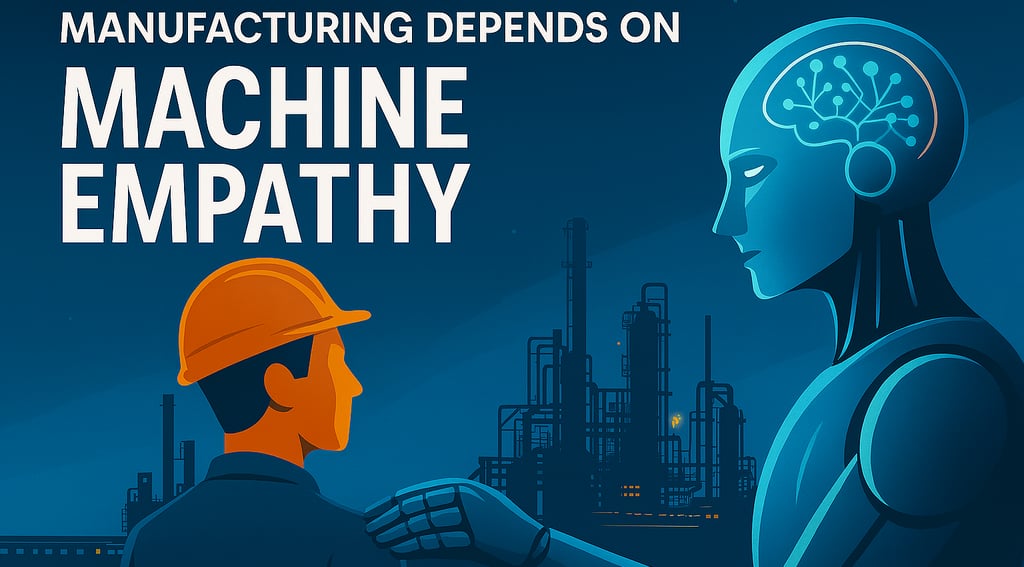Why the Future of Manufacturing Depends on "Machine Empathy"
Why the Future of Manufacturing Depends on Machine Empathy In an industry where precision and performance have long been the metrics of success, empathy might seem like an unlikely differentiator, but it’s exactly what’s next. Machine empathy isn’t about robots feeling emotions; it’s about designing AI systems that anticipate human needs, respect human limitations, and work with people, not just for them. This mindset will drive safer factories, smarter machines, and more empowered workers. The future isn’t man vs. machine. The future is man + machine, working empathetically together. Let’s build that future.
Matthew Alberts, Ph.D.
7/13/20252 min read


For much of its history, manufacturing has operated on mechanical precision and repeatable processes, a world where human operators followed strict schedules, machines followed commands, and any disruption was dealt with reactively. The tools have evolved dramatically: PLCs, sensors, ERP systems, MES platforms, all designed to collect and process data faster and more accurately than before.
Yet, despite these advancements, most factories today still think like factories of yesterday: with rigid, rule-based approaches to maintenance, quality, and throughput.
Generative AI (Gen AI) changes this paradigm by introducing something deeper, what I call "Machine Empathy."
What is Machine Empathy?
Machine empathy isn’t science fiction. It’s not about robots becoming sentient or machines developing emotions. Instead, it’s about AI systems achieving a profound contextual awareness of how machines “feel” and perform, recognizing subtle patterns that signal potential risks, inefficiencies, or opportunities, long before a human technician would notice.
Imagine a generative AI model that "understands" a machine’s operational rhythms the way a veteran plant operator does, except it can do this continuously, at scale, across an entire facility, and while learning in real time. This is no longer theory.
Machine empathy allows AI to anticipate when a piece of equipment will underperform, degrade, or fail, not based on fixed schedules, but on evolving, real-world conditions.
Why This Matters Now
In a world where every manufacturing dollar matters, where talent is stretched thin, and where downtime and inefficiency can make or break competitiveness, traditional approaches are no longer enough.
Today’s manufacturers face real challenges:
Aging industrial assets
Complex supply chains
Increasing energy costs
Sustainability pressures
Growing skills gaps
At the same time, industrial environments are producing unprecedented volumes of data from IoT sensors, control systems, and operational logs. But raw data alone isn’t useful. It must be interpreted in context.
That’s where Gen AI and machine empathy come in.
How Machine Empathy Transforms Manufacturing
In my book, The Gen AI Manufacturing Revolution, I describe three critical shifts that organizations will need to make to embed machine empathy into their operations:
🔹 From scheduled to condition-based maintenance: Routine maintenance schedules lead to unnecessary downtime or missed degradation. Gen AI-driven machine empathy continuously interprets sensor and environmental data to prioritize interventions dynamically, reducing costs and improving uptime.
🔹 From quality assurance to quality anticipation: Instead of catching defects after they occur, empathetic AI can predict where and when variations are most likely based on materials, environment, and machine condition, reducing scrap and ensuring consistency.
🔹 From reactive energy management to adaptive optimization: Energy use has typically been controlled in response to production demands. Machine empathy enables AI to adjust energy consumption proactively, aligning production with real-time energy market conditions, weather forecasts, and sustainability goals.
The Human Side of Machine Empathy
Perhaps most importantly, this is not about replacing human expertise, it’s about augmenting it.
Machine empathy means providing your operators, engineers, and decision-makers with AI tools that act as trusted collaborators, constantly monitoring, contextualizing, and offering guidance to empower smarter decisions.
This shift also demands new leadership mindsets:
Embracing uncertainty as a source of insight
Training teams to work alongside intelligent agents
Embedding ethical oversight and governance into AI deployments
Are You Ready to Lead?
Machine empathy will soon define competitive advantage in manufacturing. It’s no longer just about automation; it’s about intelligence, adaptability, and trust — both between humans and machines and between organizations and their customers.
📖 In The Gen AI Manufacturing Revolution: Smarter Factories, Enhanced Products, and Reduced Costs, I provide a roadmap for manufacturers and industrial leaders to harness generative AI as a partner in driving operational excellence.
If your factory is still relying on static rules, legacy software, and outdated assumptions, now is the time to rethink what’s possible.
